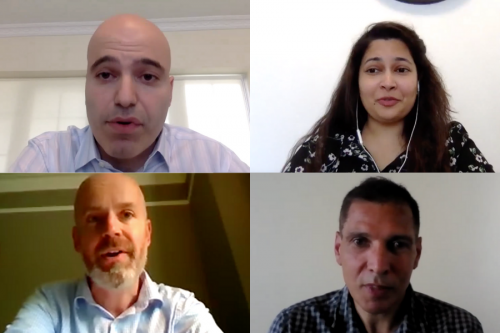How trust is helping delivery innovation and disruption

Much was made at the start of 2020 about the beginning of a new decade. However, no one when considering what the next 10 years could have in store on 1 January, predicted the gargantuan economic changes which are currently afoot.
It is against a background of global pandemics, recessions and general economic uncertainty that innovation is continuing within the finance sector, thanks to the continued rise of FinTech (financial technology) and the potential of digital currencies.
In TheBusinessDesk.com’s latest webinar, a panel of experts took the time to consider what the future could have in store for the industry and in particular why British businesses seem to be able to innovate during difficult periods.
“They say that necessity is the mother of invention”, said Rashee Pandey, head of partnerships at independent FinTech industry body, Innovate Finance. But she continued, it goes beyond that as “an environment has been created here [in the UK] for FinTechs to thrive in.” Citing the cluster of financial services business and a pro-business regulator as crucial.
It is the role of the regulator which perhaps is most crucial for supporting both innovation and disruption in the sector. How does it do that? By building trust.
Jonathan Thompson, founder and CEO of B-North a business seeking to use FinTech to disrupt the £150bn UK business lending market, commented: “Trust goes to the heart of the UK and global financial sector. In fact, the whole financial ecosystem is completely based on trust. And when that breaks down, there is a real challenge.” He adds it’s this need for trust which means regulators in the UK are so focused on enhancing and ensuring confidence and it is why he explained, B-North is going for a full UK banking licence as it’s “a gold-plated regulatory seal of approval”, which gives regulators confidence but crucially helps to build trust with customers.
The focus on trust is crucial when talking about disruption, because the rise of FinTech as a sector – one which is now hotly contested by all regions of the UK as a source for investment and economic growth – came out of the 2008 economic collapse. People lost faith and confidence in traditional financial systems and therefore looked for something else; enter FinTech.
So, as we enter a new challenging economic situation where people are perhaps looking for alternatives again, who will benefit?
Thompson and Pandey both agree FinTech will still continue to grow. But for Professor Andros Gregoriou from Brighton Business School who is a world leading researcher in stock market liquidity, the opportunity is in digital currencies.
His logic is based on history, “The 2007-2009 crisis highlighted that we needed a different ratings system, decentralisation and alternative investments,” he said. He pointed out that as in the 07-09 crisis investors, businesses and consumers are re-evaluating what’s important and he believes that one of the triggers now will be “the cost of doing business”, which puts digital/cryptocurrencies firmly in the spotlight as they “enable the cost of business to be significantly cheaper.”
Matt Dixon, CEO and co-founder of Evai.io a UK business seeking to disrupt the financial systems by developing an unbiased cryptocurrency credit ratings service, agreed with Gregoriou.
He highlighted that “Traditional banking is antiquated”, and talked about transferring money internationally for businesses purposes. Starting with the process via BACs, he explained not only would it cost him money but equally takes time – often a couple of days. This he contrasted with the use of a digital/cryptocurrency such as Bitcoin, with the transfer both free and verified in “a matter of seconds”.
“So you can see this [using cryptocurrencies] really breaks down barriers for business,” Dixon elaborated, “making business so much more efficient.”
But how does this efficiency marry with consumer trust – something you must achieve to see adoption? After all, Bitcoin and the other digital/cryptocurrencies are often cited as payment de rigueur of the dark web.
Dixon added, “It’s a bit of a myth that needs to be done away with about Bitcoin and cryptocurrency being used for all these nefarious actions.” Again, using an example, he explained how every transaction can be verified and that as it uses decentralised blockchain the trail is always “there for authorities to follow and it’s a lot better [and easier to track] than cash.”
However, if the latest statistics from the FCA are to be believed any potential issues around trust are not putting off a growing number of investors. In a report at the end of June, the FCA estimated 2.6m people in the UK had engaged with cryptoassets at some point – a figure that was up 1.1m on the same time in last year. What’s more the research highlighted that 1.9m currently had assets in cryptocurrencies and with over 50% of those having more £260 invested in them.
With a clearly growing market, Gregoriou stated, “It’s vital to create some sort of credit rating.” As, he explained, it will only be through an “unbiased credit rating, which is transparent and that people can follow” that confidence will further grow and education on the positive benefits such as efficiency and trackability can happen, ultimately leading to the economic benefits of digital currency – namely the fact it cannot be devalued like fiat money through the printing of more as there is only a finite supply.
Looking ahead, it appears we are now at a point where FinTech and cryptocurrencies are converging due to consumer demand, with Dixon explaining that it’s possible to “link Bitcoin to your credit card, so you can go out buy anything that you would normally buy in any shop, using your Bitcoin balance.”
It is therefore this growing investor and consumer demand as well as regulatory focus which will shape the future of cryptocurrencies in the UK and globally. With Thompson – although not giving a time frame – explaining he foresees a tipping point for mass adoption. He said, “It’s almost a virtuous circle of adoption, regulation, confidence which ultimately drives uptake.”
Based on this, it is clear that progress is being made with regards to adoption and regulation and that through the launch of Evai.io later perhaps greater education on the benefits and through further work by the regulators, confidence could further increase. So perhaps 2020/2021 could be the year we look back on as the moment cryptocurrencies came of age and challenged traditional paper money, all as a result of trust!









